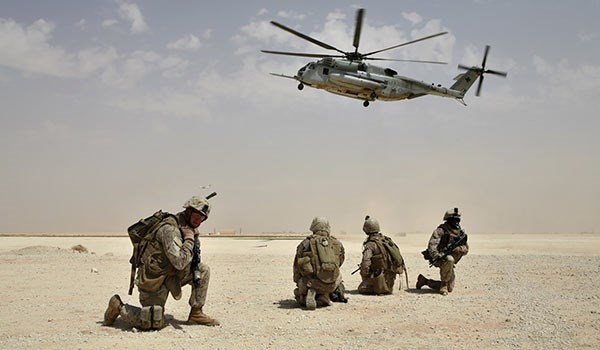
RNA - That’s not sitting well with Turkish President Recep Tayyip Erdogan, who has expressed particular outrage at the US having an airbase in the Kurdish town of Kobani, along the Turkish border and reiterating his long-standing opposition to the US having ties with the YPG at all.
Remember, Erdogan is still one of America’s main allies in the regime change war on Syria. So the policy is not bizarre, in that many of America's rogue partners in Syria are terrorist groups formed explicitly to oust the government; US officials have been openly demanding unconditional regime change for several years now. That was the whole idea when they decided to bankroll ISIL and Al-Qaeda, attack Syria, reduce it to a failed state, and create millions of refugees.
So there is no reason to believe that by building illegal military bases President Donald Trump is building bridges to Syria as well, let alone shutting down the terrorist groups’ social media and bank accounts, halting airstrikes against civilian and government targets on their behalf, or ending the flow of weapons to terror proxies and partners in crime in both Iraq and Syria.
As always, Washington’s strategic objectives in Iraq and Syria are not those of fighting terrorism, but rather consolidating US hegemony over the oil-rich Middle East and preparing for possible confrontation against the principal obstacles to this objective, Iran and Russia. For US imperialism, undisputed control over both the Persian Gulf and Central Asia would also provide the means to destabilize energy supplies to its global rival, China.
The prospects of that plan succeeding are in doubt due to such strategies and moves as the surprise missile attack by Iran on Sunday.
This latest move by Syria’s ally has only added to Washington’s frustration. Ever since Iran, Russia and Turkey also announced the creation of four de-escalation zones on May 5, the Axis of Resistance (Syria, Iran and Hezbollah) assisted by Russian air support has been marching eastward along three parallel tracks with the clear intention of liberating cities captured by ISIL and reestablishing Syria’s sovereign borders. It’s been a hard-fought slog, but the progress has been steady and ISIL has been pushed back or beaten wherever they have been met.
At the present pace, the fight against ISIL could be over in a matter of months, but that doesn’t mean US-backed terrorism and hostilities will end. War-party Washington, its regional partners in crime, and their terror proxies will never agree to withdraw from the territories they have occupied, but the general consensus seems to be that they will one way or another. The US might have actually accelerated its operations in order to grab as much land as possible before ISIL is defeated, but that does in no way mean it will have a permanent and trouble-free occupation. That will never happen:
With the stakes so high, and with the help of Iran, Russia and Hezbollah, the Syrian government is busy re-establishing control of the country all the way to its eastern borders. With Iraqi volunteer forces defeating ISIL in Mosul and reaching the Syrian-Iraqi border, the desert straddling the border is no longer a no man’s land ripe for ISIL control. The allied forces are fast dominating there - forces aligned with Iran, Russia, Iraq and Syria. There, there’s no room for the United States and its proxies either. The resistance factions wield the most influence and they are the ones that will determine the outcome of the battle for Eastern Syria as well as the postwar dynamics of the region.
Like it or not, war-party Washington has been caught flat footed. No matter how much effort it is prepared to make it won’t succeed in maintaining its hegemony over Eastern Syria, let alone control the territory east of the Euphrates to establish military bases and create a launching pad for future regime-change wars or attacks on the Syrian government and its Iranian, Russian allies.
The US cannot control the eastern border with Iraq, let alone permanently block the land route from Baghdad and Tehran. Simply put, the US doesn’t have the military assets or international support to win the regime-change war outright, which means the battlefield losses will continue to mount until American occupying forces pack up and leave. After more than six years of failed attempts, the regime changers now know more than anyone else that this is not a war the US can win even with putting more boots on the ground.
True, war-party Washington and criminal associates are racing to occupy as much land as possible. In some respects, that’s a positive development because they have realized that their regime-change war on Syria has failed and that it is coming to an end so they are positioning their occupying forces and proxies in a way that best favors their colonial policy in post-war Syria. But this desperate attempt won’t bring them legitimacy or incentive.
There are deeper issues that can’t be resolved by merely stealing land and occupying territory. Neither Iran nor Syria, nor Russia, nor the international community will ever agree to a deal in which Washington can still partition the Levant in post-war Syria and establish illegal military bases in the east where it harbors and deploys terrorists back into Syria-proper to wreak havoc, terrorize the public, threaten the central government, and destabilize the whole planet. That’s not going to happen.
The Iranian-Syrian-Russian alliance is not going to give ground on the fundamental issues of national security or terrorism. Those are non-negotiable. They have repeatedly shown that the whole point of having a military alliance against terrorism, war-party Washington and associates is to make sure those remain non-negotiable.
847/940